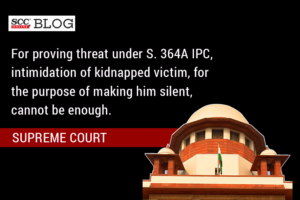Supreme Court: In appeals against the order of conviction and judgment of the Punjab and Haryana High Court , the division bench of Sanjay Kishan Kaul and B.V. Nagarathna*, J.J., granted relief to the convict/appellants, modifying the sentences imposed under Section 364-A of Penal Code, 1860 (‘IPC’) to Section 363 IPC.
In the matter at hand, a 14-year-old boywas kidnapped on his way to school on 15-02-2000 and First Information Report was lodged on the same aforesaid date. The convictswere convicted under Sections 148 and 364-A read with Section 149 IPC by the Trial Court and their conviction was affirmed by the High Court, rejecting theirplea to modify the conviction to offence under Section 363 or 365 IPC.
The issue in this case was, whether the facts, in this case, attract the offence under Section 364-A IPC and if the answer is in the negative, would it be just and proper to modify the conviction to a sentence under Section 363 of the IPC?
The Court compared Sections 361 read with Sections 363, 364 and 364-A, and noted that Section 363 IPC punishes the act of kidnapping and Section 364 punishes the offence of kidnapping or abduction of a person to murder him. Section 364A further adds to the gravity of the offence by involving an instance of coercive violence or substantial threat thereof, to make a demand for ransom. Accordingly, the maximum punishment for the three crimes is seven years imprisonment; ten years’ imprisonment and imprisonment for life or death, respectively.
Further, it said that it is necessary to prove not only that such kidnapping or abetment has taken place but , thereafter, the accused threatened to cause death or hurt to such person or by his conduct gave rise to a reasonable apprehension that such person may be put to death or hurt, or cause hurt or death to such person to compel the Government or any foreign State or international, inter-governmental organisation or any other person to do or abstain from doing any act or to pay a ransom.
The Court placed reliance on Sk. Ahmed v. State of Telangana, (2021) 9 SCC 59, whereinit was emphasised that Section 364-A IPC has three stages or components, namely,
-
kidnapping or abduction of a person and keeping them in detention;
-
threat to cause death or hurt, and the use of kidnapping, abduction, or detention with a demand to pay the ransom; and
-
when the demand is not met, then causing death.
The Court viewed these ingredients to be essential to bring the guilt under Section 364-A IPC. The use of conjunction “and” has its purpose and object. Section 364-A uses the word “or” nine times and the whole section contains only one conjunction “and”, which joins the first and second condition. Thus, for covering an offence under Section 364-A, apart from fulfilment of first condition, the second condition also needs to be proved in the case.
The Court noted three crucial differences upon comparing the victim’s statement to the police with that recorded by the Trial Court two years later after the initial statement, “first, a change in the exact timing of the threat; second, the specificity of the delivery of the threat to kill; and third, omission of the intent behind the threat”. These details are pivotal in proving the second ingredient of Section 364-A. It is established that this ingredient has not been proved beyond reasonable doubt
Further, the Court said that for proving the ingredient of threat, the intimidation of the child victim, for the purpose of making him silent, cannot be enough. If the sentence carrying a maximum sentence of death and a minimum sentence of life sentence has such a low evidentiary threshold, the difference between punishments for kidnapping under sections 363, 364 and 364-A shall become meaningless. The Court also noted that the High Court did not apply the precedent in Malleshi v. State of Karnataka, (2004) 8 SCC 95 properly.
Thus, the Court held that the convicts conviction is unsustainable under Section 364-A of IPC. and ordered their conviction under Section 363 IPC and sentenced them to imprisonment for seven years and a fine of Rs. 2000/-.
[Ravi Dhingra v. State of Haryana, 2023 SCC OnLine SC 199, decided on 01-03-2023]
*Judgment authored by: Justice B.V. Nagarathna
Justice BV Nagarathna: Igniting hope for the first ever woman Chief Justice of India
Advocates who appeared in this case:
Counsel for appellant- Advocate on Record Sri Gaurav Agrawal, Advocate Simon Benjamin, Advocate Deepshikha Sansanwal, Advocate on Record Santosh Krishnan, Advocate Sonam Anand, Advocate Yakesh Anand, Advocate Rajeev Kumar Dubey, Advocate on Record Kamlendra Mishra;
Counsel for respondent- Additional Advocate General Sri Rakesh Mudgal, Advocate Dinesh Mudgal, Advocate on Record Monika Gusain.

